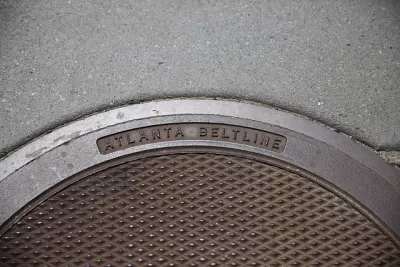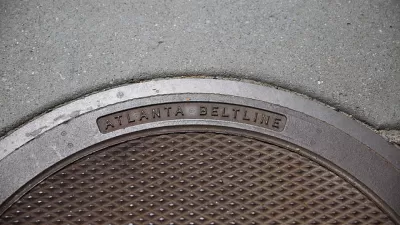Streetsblog USA shares an interview with the visionary behind the Atlanta BeltLine, who discusses how the city's booming economy has conflicted with the mission of the project.

Angie Schmitt spoke with Ryan Gravel following his high-profile resignation from the board of the Atlanta BeltLine Partnership.
As explained by Schmitt, Gravel laid out the vision of the BeltLine, to "[transform] forgotten railroad tracks circling the city of Atlanta into a recreational and active transportation corridor," and helped the idea gain political and financial support as well as attract the admiration of observers all over the country. Thus, Gravel's resignation was a big deal, and Schmitt's interview provides a chance to clear the air and sound an alarm about the pressing concerns that caused Gravel to act.
Here, Gravel explains in his own words why issues of equity and gentrification have become central in the conversation about the BeltLine:
It’s just become clear with the economy roaring back and the population in the city growing quite a lot, and projected to grow quite a lot, if we want to live up to the promise of the BeltLine we need to get more aggressive on [housing] affordability.
According to Gravel, the mission of the BeltLine partnership has come to be defined by a tension between "the need to raise money for the project and the need to leverage some of the community’s passion for the project to achieve political pressure to achieve its outcomes."
Gravel also suggests some future actions to help solve the problems he's encountered, such as loosening development regulations for housing and having a more public dialogue. Gravel also concludes by hinting at his next steps, which could include a new organization.
FULL STORY: Atlanta BeltLine Visionary Speaks Out on His Very Public Resignation

Alabama: Trump Terminates Settlements for Black Communities Harmed By Raw Sewage
Trump deemed the landmark civil rights agreement “illegal DEI and environmental justice policy.”

Study: Maui’s Plan to Convert Vacation Rentals to Long-Term Housing Could Cause Nearly $1 Billion Economic Loss
The plan would reduce visitor accommodation by 25% resulting in 1,900 jobs lost.

Planetizen Federal Action Tracker
A weekly monitor of how Trump’s orders and actions are impacting planners and planning in America.

Wind Energy on the Rise Despite Federal Policy Reversal
The Trump administration is revoking federal support for renewable energy, but demand for new projects continues unabated.

Passengers Flock to Caltrain After Electrification
The new electric trains are running faster and more reliably, leading to strong ridership growth on the Bay Area rail system.

Texas Churches Rally Behind ‘Yes in God’s Back Yard’ Legislation
Religious leaders want the state to reduce zoning regulations to streamline leasing church-owned land to housing developers.
Urban Design for Planners 1: Software Tools
This six-course series explores essential urban design concepts using open source software and equips planners with the tools they need to participate fully in the urban design process.
Planning for Universal Design
Learn the tools for implementing Universal Design in planning regulations.
Caltrans
Smith Gee Studio
Institute for Housing and Urban Development Studies (IHS)
City of Grandview
Harvard GSD Executive Education
Toledo-Lucas County Plan Commissions
Salt Lake City
NYU Wagner Graduate School of Public Service





























